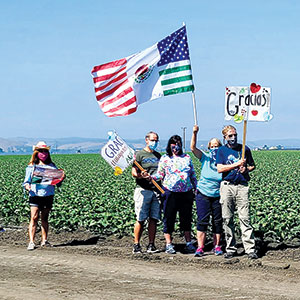

Thirty minutes into the Farmworker Caravan load-in, cars are backed up along 11th Street.
Inside the historic San Jose Woman’s Club building, Darlene Tenes of CasaQ mans the phones next to a table full of suppliespens, badges, vests, labels and census materialsfor those who will make the drive to Salinas Valley. It’s hot as hell inside, with a white box-fan barely doing its job.
“We have 500 face masks, with another 1,000 on the way,” Tenes tells me, rifling through a mixed bag of materials. “Last time somebody donated boxes, which was really helpful. This time we’re collecting kids’ masks, also.”
Organized by CasaQ, a local outfit that teaches Latinx culture via lectures, events and travel experiences, the Farmworker Caravan enlists a spirited convoy to deliver supplies and support for Central Valley campesinos. As Covid-19 migrates from cities to the impoverished areas of rural California, the farmworkers, who often live in camps of multiple families, are especially vulnerable. With Latinos disproportionately affected, the Central Valley has become a pandemic hotspot.
Farmworker Caravan drivers paint their windows and scribble messages in solidarity. They meet up at a secret locale in order to prevent anti-immigrant people from showing up to cause trouble. Then they hit the open road. This time, 103 cars have already pre-registered as I prowl around the load-in event the evening before the caravan starts its trek. It’s a massive operation, taking place on a semi-regular basis. This is the fifth one.
Outside in the driveway, large trucks with lift gatesvehicles loaned by Habitat for Humanity and Cupertino Electricare stocked with paper towels, bottled water, diapers and feminine products alongside restaurant-sized bags of beans, rice and flour. Organizations across Silicon Valley have gotten involved in recent months. On previous caravans, Garden City Construction and Rick’s Furniture loaned trucks for the convoy. This time, citizens from across the valley are donating. Employees from 30 branches of Chase Bank, for example, all contributed.
As I survey the scene, 11th Street is clogged up with cars dropping off goods. One impatient passerby gets out of his car to yell at everyone.
The load-in is scheduled from 4-8pm and it’s not yet 5pm, but the trucks are already filling up.
“We have backup,” Tenes assures me. “We have people on standby if we run out of room.” The following morning at 8am, everyone meets in the parking lot of Bay 101, a casino currently shuttered due to Covid-19, but an ideal spot with easy freeway access. No one knew the location until the night before.
As I arrive, volunteers direct the cars into the corner parking areas facing North First Street and Old Bayshore. Austere security guards hold their posts, making sure no one veers anywhere near the casino building. I’m not even allowed to pass them in order to throw my coffee cup into a garbage can. Yet the parking lot bubbles with optimism.
A live DJ plays Al Green, Santana, Linda Ronstadt and other Spanish-language tunes while cars, trucks, vans and lowriders filter in. I see families, seniors, young people and photographers. “Gracias” placards are displayed in every car and some drivers have decorated their trucks with flowers.
Everyone wears a mask and adheres to safety protocols. Some are dancing while numerous others walk around the parking lot to film the scene with their phones. Everyone will be in everyone else’s video, it seems.
Then it gets emotional as the DJ breaks out the famous farmworker pilgrimage song, “De Colores.”
In normal times, people lock arms and sway while singing along together, but with social distancing in effect, every person in the parking lot remains several feet apart while waving his or her right arm back and forth in the air. The whole experience would move even the most frozen-hearted person.
The unconditional support these people harbor for the farmworkers and their well-being is downright inspiring. Compassion for the vulnerable, the forgotten and the ignored flows from everyone. As I stand here, I feel like I haven’t done anywhere near enough.
Emotions intensify even more as the caravan falls into place. Cars line up as they leave the parking lot, with the lowriders going first, of course. Many drivers hold their arms out the window, up in the air, fists clenched for those taking photographs.
As the parking lot empties out, I am quite moved. For once, I wish I owned a car again.



